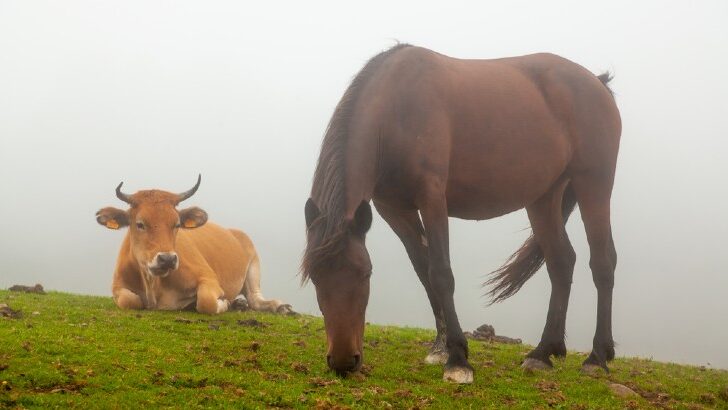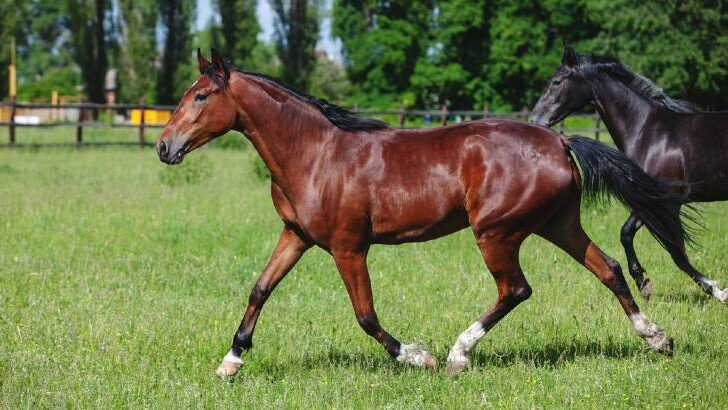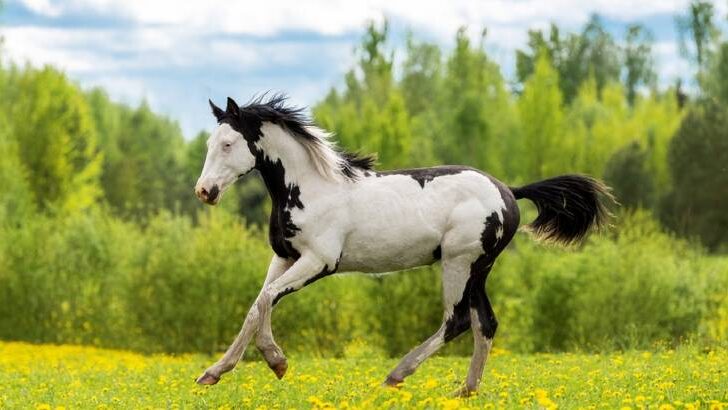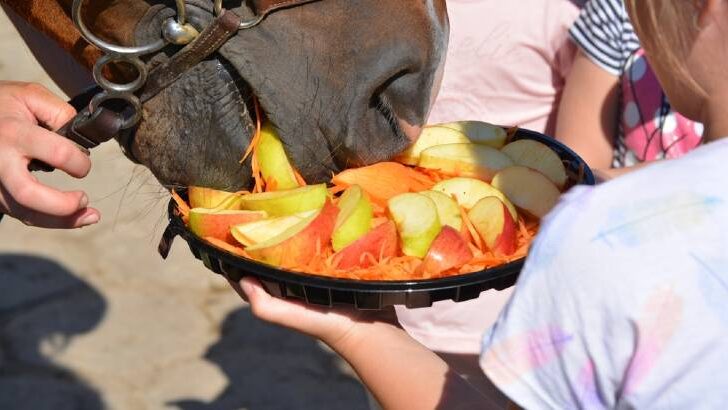Affiliate Disclaimer
As an Amazon Associate I earn from qualifying purchases. It helps me keep the website going. Thank you for your support.
If you own or look after horses and cows, you may well be wondering if they can graze together. Being able to have your horses and cows on the same pasture is convenient, and cost-effective. But is it best practice for your equine and bovine friends?
The short answer is yes, cows and horses can graze together happily. But for this to work, you need to introduce cows and horses gradually. Other factors need to be considered, such as fly control, parasite management, and the use of appropriate fencing. Additionally, cows and horses eat different types of hay, grass, and grain.
So read on to find out what factors need to be taken into consideration…
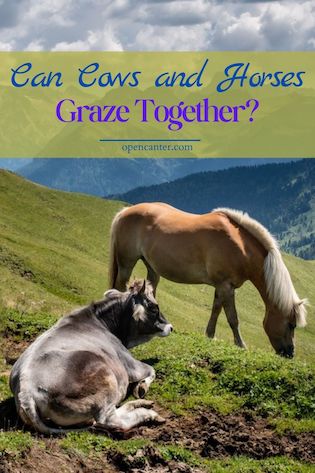
6 Tips For Letting Cows and Horses Graze Together
Cows and horses are similar in many ways – they’re both habitual grazers, for example. They also tend to have friendly dispositions and are easily handled. Both enjoy companionship and because they both love grass, it’s easy to let them graze in the same field. However, you may want to take a few precautions to keep them all safe, happy, and healthy.
Consider the following and your cows and horses will become fast friends!
1) Introduce Them Slowly
Just because mixing cows and horses can work, doesn’t mean a large group will automatically blend well. If you’re hoping to allow your cows and horses to graze together, make sure they get along first.
Exactly how you do it depends on your number of horses and cows – but do it either one at a time or in small groups. Also – always supervise at first so you can intervene if necessary. Sometimes, a more dominant horse may bully the cows.
You should be especially careful if you have stallions. Stallions have more hormones and are often a little more naturally aggressive. Of all the combinations, stallions and bulls are the most likely to have issues with each other. You may want to leave stallions out of your mixed grazing herd to avoid a massive power struggle.
Once you’re confident your group gets along, you can let them be. However, arguments may still happen so be sure to continue with regular wellness checks.
2) Cows Attract More Flies
For farmers and livestock owners of all kinds – flies are a constant thorn in their side. Horses have thin and sensitive skin, meaning they get irritated quickly. Many horse owners mitigate this with thin, breathable fly sheets. Horses can also use their tails to swish them away, but it’s not always enough.
Cows tend to attract more flies than horses, but it doesn’t bother them as much since their skin is thicker. You can help your horses by ensuring they all have full-coverage sheets and applying fly repellant every day.
When choosing fly sheets, make sure they’re appropriate for your current weather patterns. If it’s too thick or not breathable, a horse can overheat.
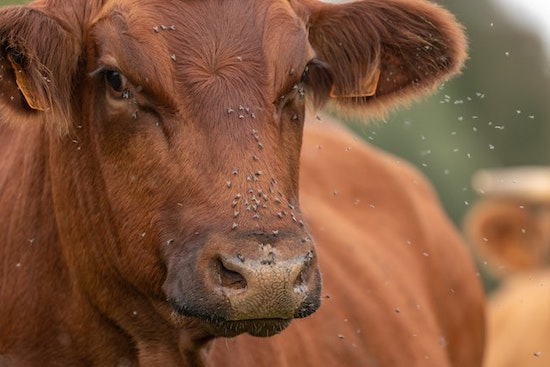
3) Use Appropriate Fencing
Fencing is another big consideration since horses and cows have different needs. Overall, cows are a lot easier to keep contained. Because their hides are tougher, they’re also more tolerant of certain fences than horses.
For example, many use low-barbed wire fencing for cows. This is not safe for horses as they can become severely injured. They also require taller fences as they’re much more curious and capable of jumping out.
Another thing to consider is voltage. While electric fencing can be appropriate and effective for horses, they can’t tolerate as much as cows.
Your best bet to contain both at once is thick, wide, wooden fencing that stands at least five feet tall. Some also place an electric line along the top of a wooden fence – just make sure it’s a voltage appropriate for horses.
4) Horses and Cows Eat Different Types of Hay and Grass
Although cows and horses are both grazers, they require different types of forage. Both have very unique stomachs and digestive systems:
- Cows can chew the same food over and over again. This means they can eat very low-quality hay/grass and still get nutrients.
- Horses have a simpler digestive system and require much higher quality hay. What they need is often more expensive.
- Cows are tougher and can eat richer grass with no issues. However, too much rich pasture can be bad for horses and their access may need to be limited.
When it comes to hay, this means you’ll have to provide the field with an appropriate level of good-quality hay. If they’re all in a group together, the cows might get some of the more expensive, higher-quality stuff even though they don’t need it. In the end, you may be paying a little more for the convenience of having your cows and horses graze together.
In terms of grass, having a blended herd may change the type of grass you want to grow in the pasture. If you’re unsure how to find the perfect balance, speaking with a veterinarian may help. Worst case scenario, the horses may need to be taken off the grass during certain times of the year when it’s richer.
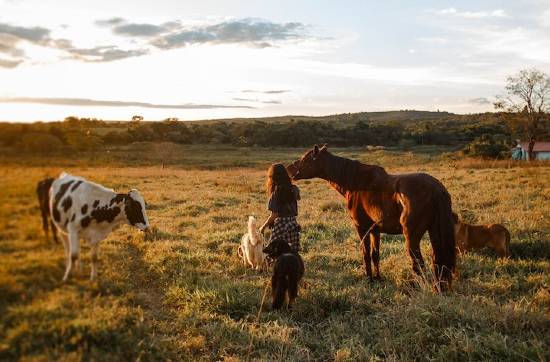
5) Horses and Cows Cannot Eat the Same Grain
Like hay, horses and cows have different grain requirements. Unlike the hay, however, the consequences of the grain being mixed up are much worse than wasting money.
The grain most cattle are fed is often unhealthy or even dangerous for horses, and vice versa. If any of your horses and cows are on a grain diet, they’ll have to be fed separately.
This is easy enough if your horses come inside overnight. However, many horses can live outside 24/7, especially during times of good weather. If you don’t already have one, you’ll need to create a routine where they separate for feeding time.
6) If Horses and Cows Graze Together You Need to Manage Parasites
Both cows and horses are prone to various worms and parasites. The good news is that they tend to attract different ones, and aren’t often harmed by each other’s parasites. That being said, you should consult your veterinarian before turning cows and horses out together.
Different geographical areas can have different parasites. A professional will know more about your area and if there is any heightened risk of horses and cows grazing together. They may recommend an extra cycle of de-worming, or a specific product.
Can Cows and Horses Graze Together: Pros and Cons
While you can let your cows and horses graze together, you must do so carefully. The above list covers some major health and safety concerns so you can prepare your facility for a blended herd.
Before mixing your cows and horses, also review the pros and cons to decide if it’s the right move for you:
Pros
- If you have limited livestock, mixing them provides socialization. Cows and horses are both herd animals that crave companionship. They will become sad and lonely without friends. So if you only have one horse and plenty of cows, for example, letting it graze with the cows will keep it happier.
- Putting them together can save space.
- It’s easier to let fields rest when you don’t have to separate your cows and horses.
- Horses tend to be pickier and avoid certain areas. Cattle don’t care as much and will eat down the areas left by the horses. This can cut down on mowing/trimming requirements.
- They attract and carry different parasites, some of which can interrupt the lifecycle of their counterpart’s parasites. This helps keep everyone healthy.
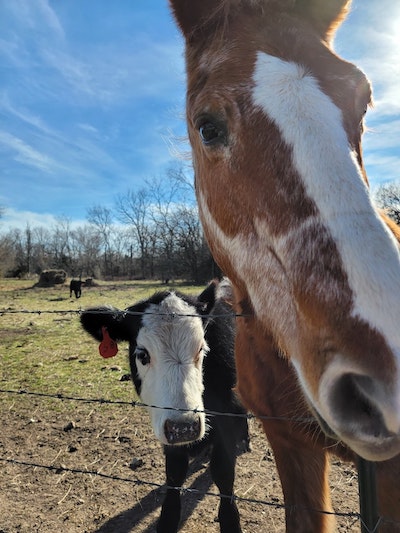
Cons
- Some money may be wasted as cows eat higher-quality hay they don’t necessarily need.
- More dominant horses may “herd” the cows a little and move them around. Aside from being annoying, this can hinder efforts to put weight on skinnier cows.
- Cows are sometimes attracted to horses’ tails and will chew on the ends of them. Horses aren’t often bothered by this, but it can end up looking raggedy. Not great for show horses.
- Separating them for grain feedings may require extra steps and time out of your day.
- You’ll have to prepare your horses for more flies than usual.
These lists are not exhaustive, but it’s a good overview of what it looks like when cows and horses graze together. Everyone’s situation is different, so hopefully, this helps you make the best decision for you and your animals!
What’s more, cows are not the only potential companions for your horse. A goat can make a good stress-busting buddy for your horse. You can read more about the calming effect of goats on horses here.
The Danger of Solitary Animals
The truth is that most domesticated animals require companionship for an optimal and healthy life. Cows and horses are both herd animals that not only desire socialization but can suffer without it:
- They can become bored and pick up annoying or even unhealthy habits (pacing, calling, aggression, etc.).
- They may become more impulsive, fearful, and mentally weak.
- Social isolation can cause increased heart rates, sweating, and respiration. Left unchecked, these can lead to additional health complications.
- Horses used for riding can become unpleasant or even dangerous to ride.
Final Thoughts
While most species will naturally gravitate towards companions of the same species, mixing isn’t out of the question. Whether it’s to maximize space or because you have limited companion options, it’s perfectly fine that cows and horses graze together. As long as you take the necessary precautions, your cows and horses can thrive and may just become best friends.

